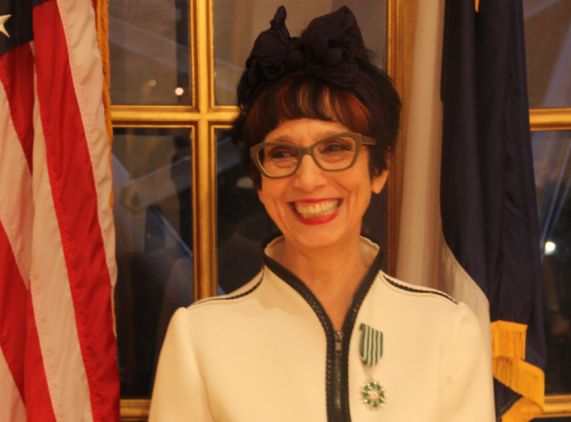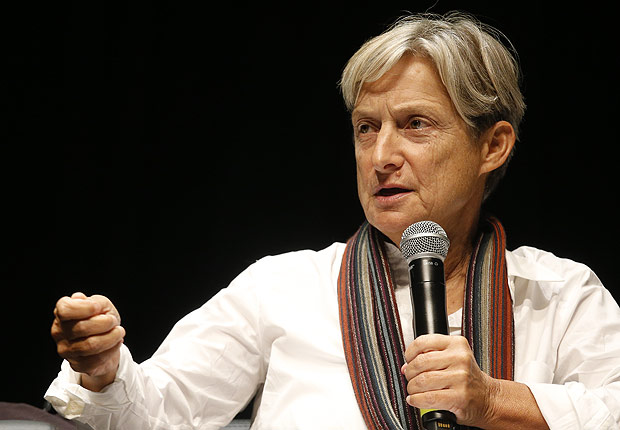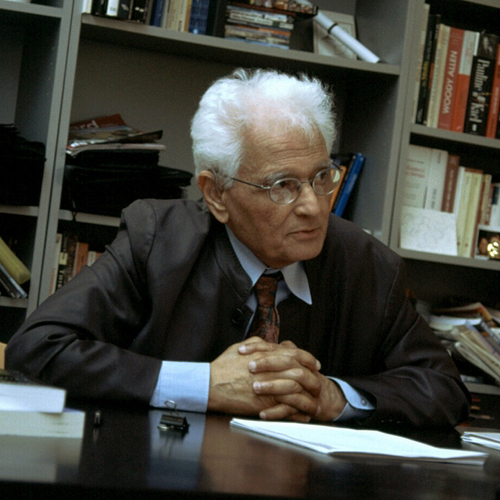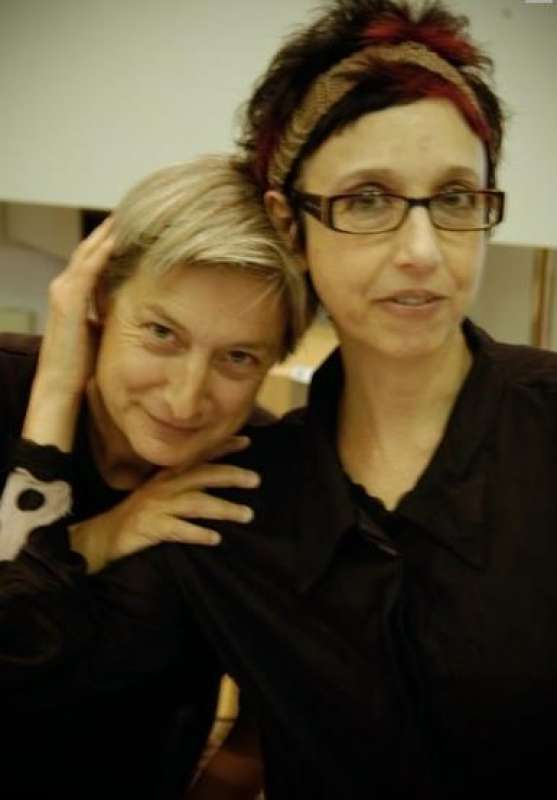A Singularly Semitic Scandal: Avital Ronell and the Corruption of Western Academia
In Homage to Catalonia (1938), his memoir of the Spanish Civil War, George Orwell describes how his wife was rudely woken by a police-raid on the hotel room she was occupying in Barcelona:
In the small hours of the morning there was a pounding on the door, and six men marched in, switched on the light, and immediately took up various positions about the room, obviously agreed upon beforehand. They then searched both rooms (there was a bathroom attached) with inconceivable thoroughness. They sounded the walls, took up the mats, examined the floor, felt the curtains, probed under the bath and the radiator, emptied every drawer and suitcase and felt every garment and held it up to the light. (Homage to Catalonia, ch. 14)
The police conducted this search “in the recognized OGPU [then the Russian communist secret-police] or Gestapo style … for nearly two hours,” Orwell says. He then notes that in “all this time they never searched the bed.” His wife was still in it, you see, and although the police “were probably Communist Party members … they were also Spaniards, and to turn a woman out of bed was a little too much for them. This part of the job was silently dropped, making the whole search meaningless.”
Orwell’s story suggests a new word to me: typhlophthalmism, meaning “the practice of turning a blind eye to essential but inconvenient facts” (from Greek typhlos, “blind,” + ophthalmos, “eye”). But it’s a long word, so let’s call it typhlism for short. Shorter is better, because the term could be used so often today. Orwell’s story is an allegory of modern Western politics and social commentary, where so many essential but inconvenient facts are “silently dropped” from analysis. For example, the Labour MP Denis MacShane and the Labour council in Rotherham were typhlistic when, for reasons of political correctness, they turned a blind eye to the horrors being committed by brown-skinned Muslims against White working-class girls.
Looking for Mr Reitman
And if you want to see another good example of typhlism at work, try one of the strangest and funniest scandals ever to set the Owl of Minerva hooting in the groves of Academe. The two central figures in the scandal are the New York University (NYU) professor Avital Ronell (born 1952) and her former graduate student Nimrod Reitman (born c. 1984). Ms Ronell, a “feminist literary theorist,” began her career studying with the enormously influential French philosopher Jacques Derrida and is now the Jacques Derrida Professor at the European Graduate School in Switzerland. As a sideline, she headed “the trauma and violence transdisciplinary studies program” at NYU. She is also a “self-defined lesbian,” while Mr Reitman is a homosexual.

Academic star Avital Ronell
Their respective sexualities, although not of course funny in themselves, are an essential part of what has made the scandal so entertaining. Mr Reitman has accused Ms Ronell of a sustained campaign of sexual harassment, including two incidents in which his 66-year-old lesbian mentor pulled him into her bed and “put my hands onto her breasts, and was pressing herself — her buttocks — onto my crotch. She was kissing me, kissing my hands, kissing my torso.”
“Sweet cuddly Baby”
To support his accusations, Reitman has published a series of emails sent to him by Ronell, who referred to him as “my most adored one,” “Sweet cuddly Baby,” “cock-er [sic] spaniel,” and “my astounding and beautiful Nimrod.” Ronell has defended herself vigorously against these accusations, which Reitman made under the American Title IX legislation originally intended to protect vulnerable female students from predatory male teachers. She has described Reitman as “miserable” and “needy,” and explained the emails as “hyperbolic gay dialect,” “florid and campy communications” between “two adults, a gay man and a queer woman” “arising from our common academic backgrounds and sensibilities.”

Academic superstar Judith Butler
And Ronell hasn’t lacked for powerful defenders. Internationally famous academics, headed by the American “feminist scholar” Judith Butler, the Slovenian philosopher Slavoj Žižek, and the Indian hermeneutician Gayatri Spivak, wrote a letter in her defense to NYU, expressing “in the clearest terms our profound and enduring admiration for Professor Ronell” and deploring the “legal nightmare” into which Reitman’s accusations had plunged this “stellar scholar” renowned for her “brilliant scholarship and spirit of intellectual generosity.” The letter noted that “some of us know the individual who has waged this malicious campaign against her” — a dark hint about Reitman’s character if ever I saw one.
But the letter merely injected a further maelstrom of runaway fireworks into the whole legal circus (as mistress of metaphor Molly K. McKew might put it). It was meant to be private, but was leaked to the philosophy blog Leiter Reports, where it was published under the title “Blaming the victim is apparently OK when the accused in a Title IX proceeding is a feminist literary theorist.” Judith Butler, the first and most important signatory, was accused of abusing her powerful position as president-elect of the Modern Language Association (MLA) and had to issue an apology to the MLA for invoking its name and prestige.
All four of them are Jews
There is a lot to be said about the scandal and about the post-modern academic milieu in which it erupted. A lot of people have duly said it. For some, it has been a welcome opportunity to assail post-modern academia and what one hostile critic has called “deconstructionist theory with a feminist/lesbian cast.” But all of this commentary has been subject to typhlism, because no-one has taken account of an obvious and important fact: all four of the most important figures associated with the scandal are drawn from a single tiny ethnic minority. This is a singularly Semitic scandal, because Avital Ronell, Nimrod Reitman, Judith Butler and Jacques Derrida are all Jews. Indeed, Ronell and Reitman are both “of Israeli heritage.”

Academic megastar Jacques Derrida
But that is not the only reason that the scandal is singularly Semitic. The unhinged behaviour of both Ronell and Reitman casts an unforgiving light on Jewish psychology and on the strong Jewish tendency towards both megalomania and malice. Bernd Hüppauf, a German academic who worked at NYU and was ousted by Ronell after giving her a job there, offers this assessment of his nemesis in the left-wing journal Salon:
Before I offered Avital Ronell her job, I’d had many in-depth conversations with her. She engaged my queries with what seemed like understanding. She said she’d throw herself into the building of an integrated study and research program. She promised actively to contribute to department research, conferences and publications. Once she had assumed the position, however, she broke all her promises. She did her best to sabotage the program. She pursued one goal: The work of Avital Ronell and Jacques Derrida must be at the center of all teaching and research. Instead of an academic program, we were left with boundless narcissism. Once she’d become the head of the German department, she had her secretary announce in a departmental meeting that in the German department no student’s written work would any longer be acceptable unless it cited Derrida and Ronell. …
The quality of teaching in the department unraveled. The carefully planned program of teaching German literature was ignored. Many students arrived in the department with minimal knowledge of German literature or history. The courses that were meant to correct this no longer existed. Now philosophy, from Hegel to Judith Butler, was taught. But multidisciplinarity quickly deteriorated into dilettantism. Students were encouraged to take philosophy seminars at other universities. Soon, students who had learned about deconstruction and feminism in Paris, but who had no idea who Gottfried Benn, Joseph Roth and Alfred Döblin were, were no exception in the department. As one student told me, “We study in a German department where French theory is taught in English.” …
Included in Professor Ronell’s instruments of domination was the absolute control of information. Information streams were strictly controlled, and a thick net was spun that captured and distributed them as she saw fit. At a department meeting Professor Ronell let it be known through her secretary that no member of the department would be allowed to make contact with any dean at NYU without her (Professor Ronell’s) explicit consent. Soon after that, there were no more department meetings. Information was exchanged only in one-on-one conversations. Whoever did not belong to the inner circle had no access to information. …
I have saved a letter from a student who was close enough to Avital Ronell to study her in detail. He was an older student who had completed training as a psychotherapist. He had wanted to write his dissertation under her guidance. After one year, he gave up, disillusioned, and left the department. I quote from an E-mail he wrote to Professor Ronell:
From my interactions with you and observing you in various settings, you give the impression that you suffer from a well-known mental illness referred to as malignant narcissism in a borderline structure … There are clear clinical descriptions of sadistic object relations. You may get some sense of why your criticisms of students are so often felt to be destructive and disillusioning: you appear to be unable to control your sadism.
(A witch hunt or a quest for justice: An insider’s perspective on disgraced academic Avital Ronell, Salon, 8th September 2018)
Da Doo Wrong Ronell
Hüppauf also notes that “squeezing me out wasn’t enough for Ronell. … At a public event she labeled me an anti-Semite. Not that she actually believed this smear. But the accusation, once uttered, was not easy to unhear, and since it fit into her political calculations, she had no scruples deploying it.” No scruples? Devious manipulation and power-grabbing? Surely those are classic “anti-Semitic” accusations. That they all seem to be perfectly true makes no difference in the modern world. Typhlism rules, remember.
But Ronell didn’t win all that power and control on her own. Just as she promoted Derrida’s and Butler’s work and reputation, so her friends promoted hers. In other words, the scandal also reveals the ethnic nepotism that has allowed Jews to dominate and corrupt certain fields in modern academia. I would say that Derrida, Butler, Ronell and Reitman are all intellectual charlatans who owe their success to ethnic nepotism and imposture. Judith Butler and Jacques Derrida, two giants of the modern humanities, have contributed nothing to serious scholarship, but enormous amounts to obscurantism and logorrhoea. Derrida’s philosophy is obscurantism, but with a strong ingredient of ethnic interests. As philosopher John Caputo puts it, “the idea behind deconstruction is to deconstruct the workings of strong nation-states with powerful immigration policies, to deconstruct the rhetoric of nationalism, the politics of place, the metaphysics of native land and native tongue” (here, p. 200). In other words, it is a philosophy which is useful in subverting the traditional peoples and cultures of the West, a common theme in Jewish intellectual activism in the diaspora.
Butler has worked hard to strengthen the hold of this anti-White philosophy on Western universities. Criticism and mockery of her execrable scholarship have had no effect. She once won first prize in the Bad Writing Contest overseen by the late philosopher Denis Dutton. Her winning piece, taken from an entirely serious article published in “the scholarly journal Diacritics,” is an excellent example of how to get to the top in po-mo academe:
The move from a structuralist account in which capital is understood to structure social relations in relatively homologous ways to a view of hegemony in which power relations are subject to repetition, convergence, and rearticulation brought the question of temporality into the thinking of structure, and marked a shift from a form of Althusserian theory that takes structural totalities as theoretical objects to one in which the insights into the contingent possibility of structure inaugurate a renewed conception of hegemony as bound up with the contingent sites and strategies of the rearticulation of power. (Bad Writing Contest for 1998)
Covert maternal tropologies
Ronell and Reitman themselves have ploughed similar but smaller furrows in the same fatuous post-modern fields. The graduate thesis written by the latter and overseen by the former was about “covert maternal tropologies and disruptions effected by femininity in theories of subjectivity.” None of the four is a serious scholar, but three of them — Derrida, Butler and Ronell — have enjoyed serious prestige, exercised enormous intellectual influence and wielded great academic power. Ethnic nepotism has plainly been involved: the Jewish charlatan Ronell began her career as the protégée of the Jewish charlatan Derrida, whose “16-year-old son Pierre Alferi” she seduced when she was 27. Now that Ronell’s attempted seduction of another young Jewish male has backfired, she has been warmly supported by the Jewish charlatan Judith Butler. She has also been warmly supported by Ilan Safit, “a visiting German scholar at NYU who has known Ronell for decades.” If you’re thinking that Ilan Safit is not a very German name, you’re right: Safit is another Israeli.

Two of a Tribe: Butler and Ronell
No mainstream writer has commented on this obvious ethnic pattern and the centrality of Jews to the Ronell scandal. Indeed, the literary critic Marjorie Perloff, also Jewish but not an admirer of “deconstructionist theory,” seems anxious to draw attention away from the pattern. Surveying the signatories of what she calls “the notorious Butler letter,” she noted in the LA Review of Books that “except for … Manthia Diawara and Gayatri Spivak, all are white — a fact no one has mentioned but which surely tells us something.” But does it tell us something? Is the failure to mention the Whiteness of the signatories an example of typhlism? I don’t think so. Reitman’s supporters are also overwhelmingly “White” and “deconstructionist theory with a feminist/lesbian cast” is a very “White” field. But it’s much more diverse in other ways than a field like physics or computer science. Women, lesbians and homosexuals are found there in far greater numbers.
And one of the superstars of “deconstruction” is the brown-skinned Indian woman Gayatri Spivak (dot, not feather), who was also one of the signatories to the notorious letter in support of Ronell. Spivak is not as stellar as the “White” Judith Butler, who is president-elect of the powerful Modern Language Association, but Ms Butler is a lesbian. If an Indian and a lesbian are so prominent in deconstruction, we can see that the field is certainly not holding oppressed minorities back. But Spivak and Butler are also examples of how the field doesn’t hold back two other groups: gasbags and intellectual charlatans. In fact, I would say that only gasbags and intellectual charlatans can flourish there.
A paradigmatic case
That’s why Jews are so hugely over-represented both in the scandal and in the academic fields it has shaken. The Ronell scandal is more proof of what Kevin MacDonald has said about Jewish intellectuals like Derrida, Sigmund Freud and Franz Boas. It is not the quality of their scholarship that has allowed figures like Derrida, Butler and Ronell to flourish in Western academia, but their ethnic networking. Ronell’s intensive activism on behalf of Derrida is a paradigmatic case, turning the department supposedly devoted to study of German literature into little more than a subsidiary of Derrida’s obscurantism in the service of subverting the culture of the West. In fact, the scandal provides an example of all the background traits for Jewish activism identified by MacDonald: Ethnocentrism and ethnic networking, intelligence (their jargon-filled nonsense nevertheless requires high verbal IQ), their aggressiveness (Ronell single-handedly turning an entire department to her purposes against the wishes of previous faculty), and psychological intensity (the emotional energy that fuels the aggression needed to carry this through in the face of strong opposition).
All these things are obvious in the Ronell scandal, but no respectable commentator can mention them. Typhlism is imposed on mainstream academics and journalists because any criticism of Jews will be savagely punished. Derrida and his followers haven’t done as much harm to Western civilization as Freud or Marx and their followers, but they’ve done far too much all the same. So long as charlatans like Judith Butler and Avital Ronell retain their power and prestige, we can draw only one conclusion. Western academia is corrupt, diseased and malignant. God or Mother Nature gave us eyes for a reason: to observe important aspects of reality and act on them to benefit or protect ourselves. Typhlism stops us doing that, which is why typhlism has to end.
Appendix: “The Notorious Butler Letter”
Taken from “Blaming the victim is apparently OK when the accused in a Title IX proceeding is a feminist literary theorist” at the philosophy blog Leiter Reports.
May, 11, 2018
Andrew Hamilton
President, New York University
Katharine Fleming
Provost, New York University
Dear President Hamilton and Provost Fleming,
We write as long-term colleagues of Professor Avital Ronell who has been under investigation by the Title IX offices at New York University. Although we have no access to the confidential dossier, we have all worked for many years in close proximity to Professor Ronell and accumulated collectively years of experience to support our view of her capacity as teacher and a scholar, but also as someone who has served as Chair of both the Departments of German and Comparative Literature at New York University. We have all seen her relationship with students, and some of us know the individual who has waged this malicious campaign against her. We wish to communicate first in the clearest terms our profound an enduring admiration for Professor Ronell whose mentorship of students has been no less than remarkable over many years. We deplore the damage that this legal proceeding causes her, and seek to register in clear terms our objection to any judgment against her. We hold that the allegations against her do not constitute actual evidence, but rather support the view that malicious intention has animated and sustained this legal nightmare.
As you know, Professor Ronell has changed the course of German Studies, Comparative Literature, and the field of philosophy and literature over the years of her teaching, writing, and service. She is responsible for building the field of literary studies at New York University, but also throughout Europe as a result of her brilliant scholarship and spirit of intellectual generosity. Her students now teach at leading research institutions in the US, France, and Germany, and her intellectual influence is felt throughout the humanities, including media and technology studies, feminist theory, and comparative literary study. There is arguably no more important figure in literary studies at New York University than Avital Ronell whose intellectual power and fierce commitment to students and colleagues has established her as an exemplary intellectual and mentor throughout the academy. As you know, she is the Jacques Derrida Chair of Philosophy at the European Graduate School and she was recently given the award of Chevalier of Arts and Letters by the French government.
We testify to the grace, the keen wit, and the intellectual commitment of Professor Ronell and ask that she be accorded the dignity rightly deserved by someone of her international standing and reputation. If she were to be terminated or relieved of her duties, the injustice would be widely recognized and opposed. The ensuing loss for the humanities, for New York University, and for intellectual life during these times would be no less than enormous and would rightly invite widespread and intense public scrutiny. We ask that you approach this material with a clear understanding of the long history of her thoughtful and successive mentorship, the singular brilliance of this intellectual, the international reputation she has rightly earned as a stellar scholar in her field, her enduring commitments to the university, and the illuminated world she has brought to your campus where colleagues and students thrive in her company and under her guidance. She deserves a fair hearing, one that expresses respect, dignity, and human solicitude in addition to our enduring admiration.
Sincerely,
Judith Butler, Maxine Elliot Professor, Department of Comparative Literature, University of California, Berkeley, President-Elect, Modern Language Association (2020)
Emily Apter, Julius Silver Professor of French and Comparative Literature, Chair, Department of Comparative Literature, New York University
Catharine Stimpson, University Professor, New York University, former Dean of the Graduate School
John T. Hamilton, William R. Kenan Professor of German and Comparative Literature Chair, Department of Germanic Languages and Literatures, Harvard University
Isabelle Alfandary, Université Sorbonne Nouvelle, Présidente de l assemblée collégiale du collège international de philosophie, Paris
Jean-Luc Nancy, Professeur émérite, Université de Strasbourg
Edward J. Sullivan, Helen Gould Sheppard Professor of the History of Art
Institute of Fine Arts – Deputy Director, Department of Art History, New York University
Geoffrey Bennington, Asa G. Candler Professor of Modern French Thought, Emory University; Chair, Department of Comparative Literature
Laurence Rickels, writer and professor, European Graduate School; Visiting Professor, New York University
Pierre Alfari, Professor, Paris School of Fine Arts
Peter Connor, Professor of German, Barnard College
Manthia Diawara, Professor of Cinema Studies, Tisch School of the Arts, New York University
Denis Hollier, Department of French Literature, Thought, and Culture, New York University
Christopher Wood, Professor and Chair, Department of German, New York University
Susan Bernstein, Professor of German and Comparative Literature, Brown University
Cathy Caruth, Frank H.T. Rhodes Professor of Humane Letters, Cornell University
Cynthia Chase, Professor of French and Comparative Literature, Cornell University
Jonathan Culler, Distinguished Professor of French and Comparative Literature, Cornell University
Diane Davis, Professor and Chair, Department of Rhetoric, University of Texas-Austin
Hent de Vries, Paulette Goddard Professor of the Humanities, New York University
Bernhard Siegert, Professor for the History and Theory of Cultural Techniques, Bauhaus University Weimar
Joan W. Scott, Professor Emerita, School of Social Science, Institute for Advanced Study
Hans-Christian von Herrmann, Professor of Literature, Technical University Berlin
Suzanne Doppelt, writer and photographer, Paris; faculty, European Graduate School
Rudiger Campe, Professor of German, NYU and Frankfurt an der Oder
Vincent Broqua, Associate Professor of French at the University of Paris Est Créteil
Christopher Fynsk, Dean and Professor, European Graduate School
Elizabeth Rottenberg, Professor of Philosophy, DePaul University
Antje Pfannkuchen, Associate Professor of German, Dickinson College
Emanuela Bianchi, Associate Professor, Department of Comparative Literature, New York University
Mina Cheon, faculty, Maryland Institute College of Art
Michael G. Levine, Professor of German, Rutgers University
Paul North, Professor of German, Yale University
Elissa Marder, Chair, Department of French and Italian, Emory University
Nicola Behrmann, Associate Professor, German Languages and Literatures, Rutgers University-New Brunswick
Kristina Mendocino, Mellon Assistant Professor of Humanities and German, Brown University
Jeffrey Wallon, Professor of Comparative Literature, Hampshire College
Francois Noudelmann, Professor of Philosophy, University of Paris VIII
Jesus Mario Lozano Alamilla, Professor of Music, Universidad de las Americas Puebla, Mexico
Sam Weber, Professor of German, Northwestern University
Peter Fenves, Joan and Sarepta Harrison Professor of Literature, Department of German, Northwestern University
Shoshana Felman, Woodruff Professor of Comparative Literature and French, Emory University
Gayatri Chakravorty Spivak, University Professor, Columbia University
Slavoj Zizek, Distinguished Professor, Humanities Institute, University of London, Global Professor, New York University
Marc Redfield, Chair, Department of Comparative Literature, Brown University
Peter Szendy, David Herlihy Professor of Comparative Literature and Humanities
Anselm Haverkamp, Professor emeritus NYU and Honorary Professor of Philosophy, Ludwig Maximilians-University Munich/ Germany
Barbara Vinken, Chair of Romance Languages, Ludwig Maximilians-University Munich, Germany
Arno Böhler, Professor University of Vienna, Department of Philosophy and University of Applied Arts Vienna
Susanne Valerie Granzer, Professor, University of Music and Performing Arts Vienna
Elizabeth Weed, editor, differences, former director, Pembroke Center, Brown University





Comments are closed.